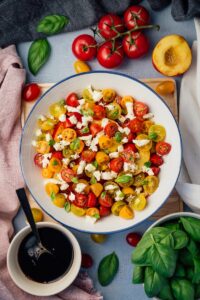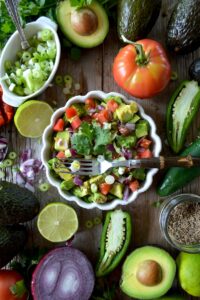The truth behind whether there is one “best” diet
More and more studies are being done to answer the age-old question: “What is the best diet?” The answer often depends on your personal goals. But, if your goal is to live a longer and healthier life with less risk of chronic disease, keep reading.
 When it comes to reducing your risks of heart disease, obesity, diabetes, and several cancers, as well as supporting bone and brain health, there seems to be a dietary pattern that gets recommended over and over again. And for good reason. Yet another big review study was recently published that looked at data from 153 studies (involving 6,550,664 participants!) to answer this seemingly simple question.
When it comes to reducing your risks of heart disease, obesity, diabetes, and several cancers, as well as supporting bone and brain health, there seems to be a dietary pattern that gets recommended over and over again. And for good reason. Yet another big review study was recently published that looked at data from 153 studies (involving 6,550,664 participants!) to answer this seemingly simple question.
Researchers from several universities across the United States reviewed existing studies to see if there was an association between dietary patterns and “all-cause mortality” (death from all causes).
They looked for studies that compared what adults ate and for how long they lived. Studies were included as long as they met minimum criteria, regardless of the findings. Interestingly, even though dozens of studies met these inclusion criteria, a clear pattern emerged.
Here’s what they found. Adults who ate more vegetables, fruits, legumes, nuts, whole grains, high-quality fats, fish, and lean meat or poultry (when meat was included) were associated with a decreased risk of death from all causes. These dietary patterns were also low in processed meat, and refined carbohydrates or sweets. In other words, long life is linked to eating an abundance of plants and good fats, along with some fish, and optionally lean meat or poultry.
Is there a name for this type of healthy diet? A number of different “diets” recommend this eating style. They include the Mediterranean, prudent, Healthy Eating Index, DASH (Dietary Approaches to Stop Hypertension). These are all considered to be high-quality diets with nutrient-dense foods and are associated with better health, regardless of diet type or dietary pattern name.
You’ll notice that this study isn’t recommending one specific diet or foods, but rather it takes a more holistic view of the overall eating style or pattern and looks at broad categories of foods in several different named diets.
Pro Tip: “Dietary patterns are the quantities, proportions, variety, or combination of different foods, beverages, and nutrients in diets as well as the frequency with which they are habitually consumed.”
You may be asking yourself when should someone start adopting an eating pattern like this?
How does now sound? Regardless of which life stage you’re in, having a higher-quality, more nutrient-dense diet will help support your health and longevity. These nutrition recommendations can apply to any age and stage to help reduce your risk of chronic diseases and mortality.
Overall, “nutrient-dense dietary patterns, regardless of pattern label or name, were associated with significantly lower all-cause mortality risk.”
Let’s sum up. Enjoy more:
- vegetables
- fruits
- legumes
- nuts
- whole grains
- High quality fats
- fish
- lean meat or poultry (if you want to eat meat)
Enjoy less:
- processed meat
- refined carbohydrates or sweets
RECIPE: Grilled Mediterranean Primavera Salad
By Chef Barb Sheldon, MA
This salad reflects the principles of the Mediterranean Diet- lots of fresh, whole, seasonal food, high quality fat, and nothing artificial or sugar-filled.
Serves 4
Ingredients
12 mini bell peppers or 2 full sized red bell peppers, washed
1 bunch fresh asparagus , chopped into bite-sized pieces
1 zucchini, chopped lengthwise, then in half-moons
1 bunch cherry tomatoes
1/2 cup olives of choice, pitted and chopped
1 lemon, zested and halved
1/4 cup balsamic vinegar
1 clove garlic, chopped
1/2 cup extra virgin, cold pressed olive oil
1 bunch fresh basil, torn into bite sized pieces
Sea salt and pepper, to taste
Optional:
Goat or sheep feta, crumbled
Leftover cooked gluten free grain like wild rice, quinoa
Protein of choice such as free-range chicken or organic tofu
Method
To a medium mixing bowl, add chopped zucchini, chopped garlic, balsamic vinegar and coat with 1/4 cup olive oil. Add salt and pepper to taste and let marinade while you prepare the rest.
Grill mini- peppers or sliced bell peppers over an open flame until just charred on the outside or use a cast iron pan to achieve the same effect. No oil is necessary.
Cool. Slice into bite sized pieces.
To a hot cast iron pan, add 1 tbsp olive oil. Ensure the oil does not smoke. Control your pan temperature to prevent this. Add asparagus and zucchini and saute just until tender-crisp.
On a platter, combine vegetables and sprinkle with olive oil , lemon zest and juice, basil, and salt and pepper. At this point, you could add your optional ingredients to make a full meal.





